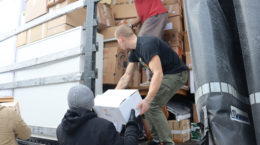On April 16, 2025, Belarus’s Ministry of Internal Affairs officially labeled Father Vyacheslav Barok, a Catholic priest from Rossony (Vitebsk Region), as an “extremist formation.” According to the ministry, this classification encompasses his personal online presence – including his YouTube channel, Telegram, Facebook page, and even his email address.
In other words, the entire extremist group consists of one man: a priest with a conscience.
Father Barok was first targeted in December 2020. He was arrested and sentenced to 10 days in jail for posting a poster by artist Vladimir Tsesler, which authorities absurdly claimed contained “Nazi symbols.” He was then investigated by the Belarusian Investigative Committee for “extremist” content in his theological video blog, where he discussed Christian ethics and spoke out against state violence. In 2021, facing increasing threats, he was forced into exile.
His social media platforms were later declared “extremist materials.” Now, the state has gone even further — effectively criminalizing his entire identity and presence.
The case of Father Barok is a stark illustration of how Belarusian authorities are weaponizing anti-extremism laws to silence dissenting voices, including religious leaders. It reflects a disturbing escalation: from punishing peaceful protest to criminalizing thought, faith, praying and speech.
The region of Vitebsk, where Father Barok is from — and where the human rights orgaisation Our House was also born – leads the region in the number of Catholic priests detained under politically motivated charges.

A Place of Sanctuary: The Church That Saved Thousands
When Russia launched its full-scale invasion of Ukraine in February 2022, the world was unprepared for the sheer scale of the humanitarian disaster that followed. Millions fled across borders – cold, hungry, frightened. And in Warsaw, one catholic church became a lighthouse of hope.
It was Father Vyacheslav Barok who opened the doors of the Catholic Church of the Three Crosses to Our House, offering us free space to create a humanitarian aid center for Ukrainian war refugees in the very heart of the city.
Thanks to his courage and solidarity, and with the essential support of the International Society for Human Rights (IGFM – Wittlich), Our House was able to organize a large-scale humanitarian warehouse. Three massive humanitarian trucks — each carrying 18 tons of essential aid — were sent by IGFM to that church. The supplies included clothing, hygiene products, shoes, blankets, children’s toys, food, medicine, and other vital items for survival.
But this was not just about logistics – it was about humanity in action.
In the first critical months of the war, more than 10,000 Ukrainian refugees passed through our center, many arriving straight from the border. They came on buses knowing that this was the place where they could get help – food, water, warm clothes, shelter, and emotional support.
Our House’s volunteers worked around the clock. They lifted boxes until their hands bled, they went days with almost no sleep, they fell from exhaustion – and they got up again. Because every refugee who entered the church deserved to be treated with dignity. Because no one else was doing what we were doing at that scale and with that speed.
We built a 24/7 humanitarian response operation inside a sacred space — with compassion, urgency, and a sense of moral duty that transcended borders and faiths.
We are deeply proud of what we achieved – and we know that none of it would have been possible without Father Barok’s trust and bravery and IGFM-Wittlich Solidarity in Action.
Today, the same priest who helped save thousands of war refugees is being labeled an extremist by the Belarusian regime.
We call on churches, international partners, and human rights defenders not to remain silent. Persecuting a man of peace for his compassion is not justice – it is tyranny.
Solidarity is not a crime. Compassion is not extremism.
![]()







